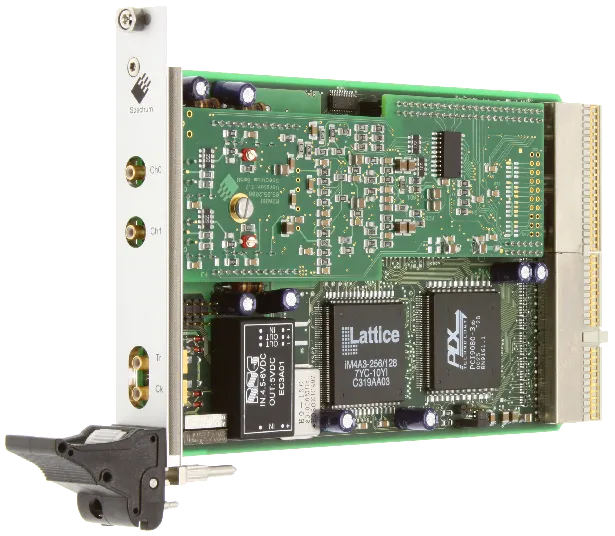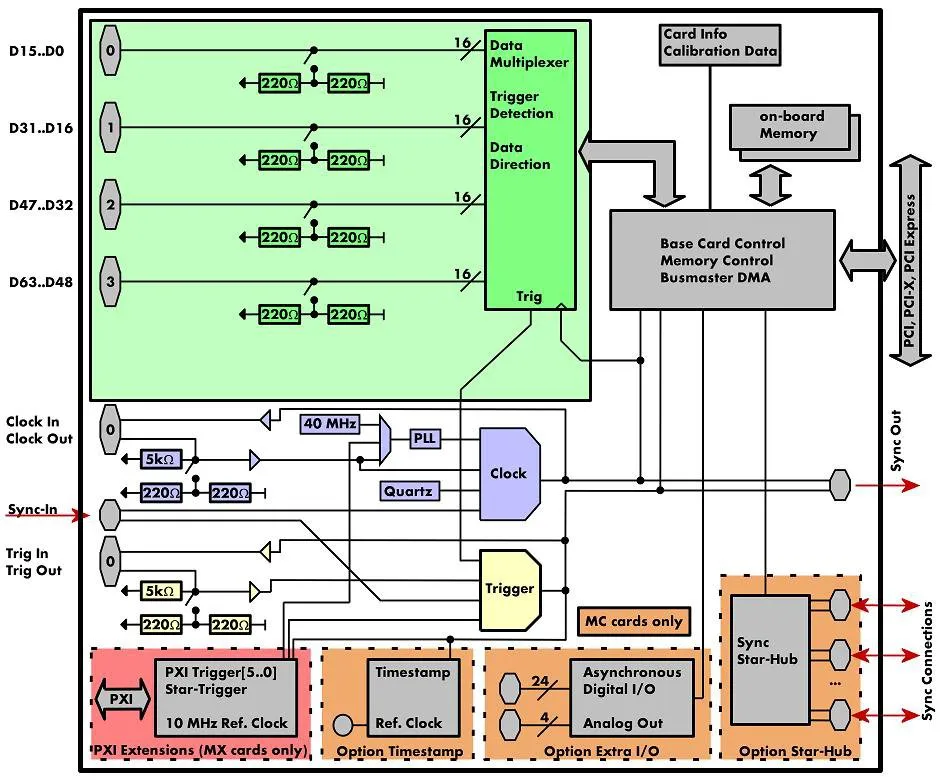THIS PRODUCT IS END-OF-LIFE. Show more about end-life-products policy.
Product:
MX.7011
Fast digital I/O with TTL levels
Description:
The MX.70xx series of fast digital I/O boards offers a resolution between 1 bit and 32 bit with a maximum sampling rate of 125 MS/s (60 MS/s). Every 16 bit / 32 bit of the board can be separately programmed for input or output. The on-board memory of up to 128 MByte can be completely used for recording or replaying digital data. Alternatively the MX.70xx can be used in FIFO mode. Then data is transferred on-line to PC memory or hard disk. The internal standard synchronisation bus allows synchronisation of several MX.xxxx boards. Therefore the MX.70xx board can be used as an enlargement to analogue boards.
Facts & Features:
- Up to 125 MS/s at 16 bit
- Up to 60 MS/s at 32 bit
- 8, 16 or 32 bit mode
- 110 Ohm input impedance selectable
- Inputs 3.3 V and 5 V TTL compatible
- Up to 128 MByte on-board memory
- 64 MByte standard memory installed
- Pattern/Edge/Pulsewidth trigger
- FIFO mode for input and output
- Synchronization possible
- CompactPCI/PXI 3U compatible
- Supporting PXI star trigger
- Supporting PXI trigger bus
- Supporting PXI reference clock
Application examples:
- Pattern generation for parameter tester
- A/D converter development
- Data acquisition at a medical tomograph
- Production test of IGBT modules
- CCD sensor simulation
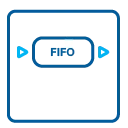
FIFO mode
The FIFO mode is designed for continuous data transfer between measurement board and PC memory (with up to 100 MByte/s) or hard disk. The control of the data stream is done automatically by the driver on interrupt request. The complete installed on-board memory is used for buffer data, making the continuous streaming extremely reliable.Repeated Output
When repeated output is used the data of the on-board memory is replayed continuously until a stop command is executed or N times. As trigger source one can use the external TTL trigger or the software trigger.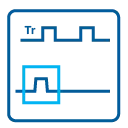
Singleshot Output
When singleshot output is activated the data of the on-board memory is replayed exactly one time. As trigger source one can use the external TTL trigger or the software trigger.PXI Star Trigger Card (Optional)
The MX.9010 is a special PXI star trigger card designed for the Spectrum PXI products. It allows to route clock and trigger synchronously to all PXI slots that are connected to the star trigger slot. The PXI reference clock is overwritten and external trigger events are synchronized to the sampling clock.

External Trigger
All boards can be triggered using an external TTL signal. It's possible to use positive or negative edge also in combination with a programmable pulse width. An internally recognized trigger event can - when activated by software - be routed to the trigger connector to start external instruments.

Gated Replay
The Gated Sampling option allows data replay controlled by an external gate signal. Data is only replayed if the gate signal has a programmed level.


Multiple Replay
The Multiple Replay option allows the fast repetition output on several trigger events without restarting the hardware. With this option very fast repetition rates can be achieved. The on-board memory is divided in several segments of same size. Each of them is generated if a trigger event occurs.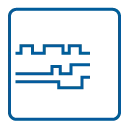
Pattern Trigger
For every bit of the digital input the pattern trigger defines individually the expected level or sets the bit to don't care'. In combination with pulsewidth counter and edge detection the pattern trigger could be used to recognise a huge variety of trigger events.
PXI Trigger
The Spectrum cards support star trigger as well as the PXI trigger bus. using a simple software commend one or more trigger lines can be used as trigger source. This feature allows the easy setup of OR connected triggers from different cards.
Timestamp
The timestamp option writes the time positions of the trigger events in an extra memory. The timestamps are relative to the start of recording, a defined zero time, externally synchronized to a radio clock, or a GPS receiver. With this option acquisitions of systems on different locations can be set in a precise time relation.
External Clock
Using a dedicated connector a sampling clock can be fed in from an external system. It's also possible to output the internally used sampling clock to synchronize external equipment to this clock.
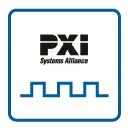
PXI Reference Clock
The card is able to use the 10 MHz reference clock that is supplied by the PXI system. Enabled by software the PXI reference clock is feeded in the on-board PLL. This feature allows the cards to run with a fixed phase relation.
Reference Clock
The option to use a precise external reference clock (normally 10 MHz) is necessary to synchronize the board for high-quality measurements with external equipment (like a signal source). It's also possible to enhance the quality of the sampling clock in this way. The driver automatically generates the requested sampling clock from the fed in reference clock.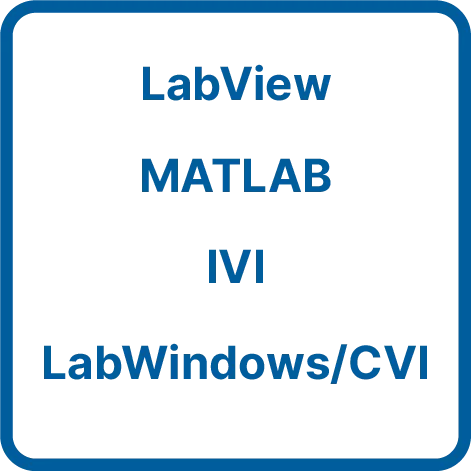
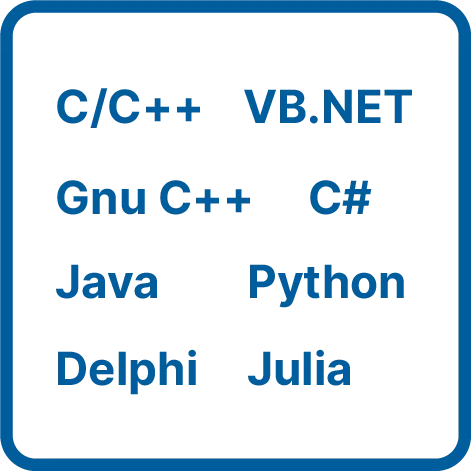
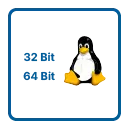

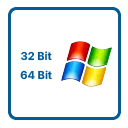
This standard driver is included in the card delivery and it is possible to get the newest driver version free of charge from our homepage at any time. There are no additional SDK fees for the classical text-based programming. All boards are delivered with drivers for Windows 7, Windows 8, Windows 10 and Windows 11, all 32 bit and 64 bit.
| Product | Channels | Max. Samplerate |
|---|---|---|
| MX.7005 | 16 | 125 MS/s |
| MX.7010 | 16 | 125 MS/s |
| On different platforms | Bus | Max. Bus Transfer speed |
|---|---|---|
| M2i.7011 | PCI-X | 245 MByte/s |
| M2i.7011-Exp | PCI Express x1 | 160 MByte/s |
| MC.7011 | CompactPCI | 100 MByte/s |
| MI.7011 | PCI | 100 MByte/s |
Documents
Data sheet of the MX.70xx family |
21.02.2022 | 307 K | ||
Manual of MX.70xx family |
21.02.2022 | 3 M | ||
Data sheet of SBench 6 |
15.01.2024 | 999 K | ||
Manual for MATLAB drivers for MI/MC/MX |
21.02.2022 | 70 K | ||
LabVIEW Manual for MI/MC/MX.70xx |
21.02.2022 | 240 K | ||
Manual for SBench 6 |
21.02.2022 | 7 M |
WINDOWS DRIVER + SOFTWARE
MI/MC/MX/PCI.xxx Windows 98/NT 32 Bit Drivers |
21.02.2022 | 353 K | ||
MI/MC/MX/PCI.xxx Windows XP/Vista 32 Bit Drivers |
21.02.2022 | 381 K | ||
MI/MC/MX/PCI.xxx Windows XP/Vista 64 Bit Drivers |
21.02.2022 | 579 K | ||
MI/MC/MX/PCI.xxx Windows 7/8 32 Bit Drivers |
4 | 21.02.2022 | 397 K | |
MI/MC/MX/PCI.xxx Windows 7/8 64 Bit Drivers |
4 | 21.02.2022 | 604 K | |
MI/MC/MX/PCI.xxx Windows 10 32 Bit Drivers |
4 | 21.02.2022 | 415 K | |
MI/MC/MX/PCI.xxx Windows 10/11 64 Bit Drivers |
4 | 21.02.2022 | 627 K | |
C/C++ driver header and library files |
7.01 | 22.04.2024 | 43 K | |
SBench 5 Installer |
5.3.0 | 21.02.2022 | 5 M | |
SBench 6 (32-bit) Installer / Windows 7, 8, 10 |
6.5.08 | 22.04.2024 | 36 M | |
SBench 6 (64-bit) Installer / Windows 7, 8, 10, 11 |
6.5.08 | 22.04.2024 | 39 M | |
MI / MC / MX MATLAB driver + examples |
21.02.2022 | 714 K | ||
MI / MC / MX LabVIEW Driver |
21.02.2022 | 8 M | ||
MI / MC / MX Examples for C/C++, Delphi, VB, LabWindows/CVI, ... |
21.02.2022 | 700 K |
LINUX DRIVER + SOFTWARE
MI / MC / MX Linux 32 bit and 64 bit Drivers |
4 | 21.02.2022 | 18 M | |
SBench 6 Linux 32 (.rpm) |
6.5.08 | 22.04.2024 | 26 M | |
SBench 6 Linux 64 (.rpm) |
6.5.08 | 22.04.2024 | 26 M | |
SBench 6 Linux 32 (.deb) |
6.5.08 | 22.04.2024 | 23 M | |
SBench 6 Linux 64 (.deb) |
6.5.08 | 22.04.2024 | 22 M | |
SBench6 Jetson (.deb) |
6.5.08 | 22.04.2024 | 11 M | |
MI / MC / MX Linux Examples (C/C++) |
21.02.2022 | 53 K |
Firmware
Case Studies
| Digital Data Logger | Real-time high speed digital data logger for embedded systems |
21.02.2022 | 510 K |
Product Notes
| Trigger and Sync | Trigger, Clock and Synchronization Details at high-speed Digitizers |
21.02.2022 | 1 M |
